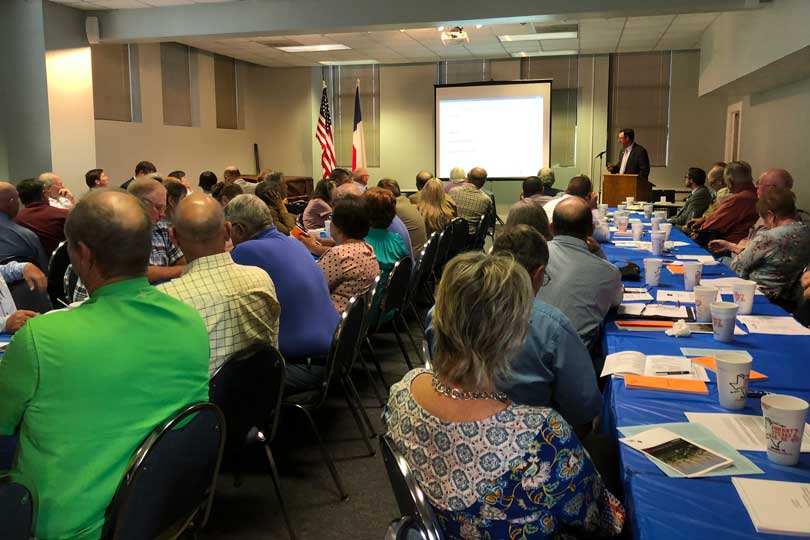By Julie Tomascik
Editor
The future of Texas agriculture and the rights of landowners were among the topics discussed at recent Texas Farm Bureau (TFB) Policy Development meetings across the state as members considered and discussed policy topics for the upcoming year.
“Policy development is the way the county members speak through Farm Bureau on issues that affect them out on their farm and ranch,” Glen Jones, TFB director of Research and Policy Development, said. “As a grassroots organization, Farm Bureau policy starts with our members, and their policies guide the state and national organization.”
More than 800 county leaders were in attendance at the district Policy Development meetings.
Imitation meat and milk products were discussed as it pertains to how lab-grown proteins and dairy-substitute beverages are labeled.
“Farmers and ranchers are concerned and discussed the need for accurate labeling and agency enforcement to define the differences between these products, because federal definitions are under debate and aren’t clearly defined now,” Jones said.
He noted animal identification and disease traceability were also discussed as an option to enhance agricultural products’ desirability in domestic and overseas markets.
The current interstate traceability program does not apply to cattle less than 18 months of age, which leaves a substantial portion of the U.S. cattle herd potentially unidentified and difficult to trace back to a farm of origin.
“Members recognized a need to have a more desirable product to export, but they also don’t want a burdensome regulation,” Jones said.
Other top issues discussed at the meetings included the electronic logging device (ELD) mandate, commercial driver’s licenses (CDL), immigration and eminent domain.
A one-size-fits-all federal regulation under the ELD mandate puts agricultural haulers at risk.
“Farmers and ranchers discussed the need for a long-term solution that solves issues specific to agriculture,” Jones said. “Flexibility for haulers with live cargo, like livestock and insects, and other perishable commodities is vital for agriculture to prosper.”
Jones noted discussion on CDLs also surfaced. There’s a need for more testing locations in rural areas.
“Timing and location are a burden for taking the CDL test,” Jones said. “Those in rural areas have to travel a longer distance to take the CDL test, so more testing sites are needed.”
The lack of a stable workforce for agriculture places domestic food production at risk.
“Agriculture faces a critical farm labor shortage, and members expressed the need for a guest worker program to secure a reliable and competent workforce,” Jones said.
The need for eminent domain reform was also discussed at several of the meetings, and it’s a top priority for the upcoming legislative session.
“We didn’t achieve the eminent domain reform we wanted to see last session, but our members aren’t giving up,” he said. “The issue of strengthening private property rights and fairness in eminent domain proceedings continually surfaced across the state.”
Registering agricultural trailers for a term longer than one year, foreign trade and possible farm safety training programs were also discussed.
County Farm Bureaus must submit resolutions to the state office by Friday, Oct. 26.
Policy proposals approved by county Farm Bureaus will be considered by the TFB Resolutions Committee in early November.
The committee’s recommendations will be forwarded to the TFB Annual Meeting Dec. 1-3 in Corpus Christi for consideration by the voting delegates.

